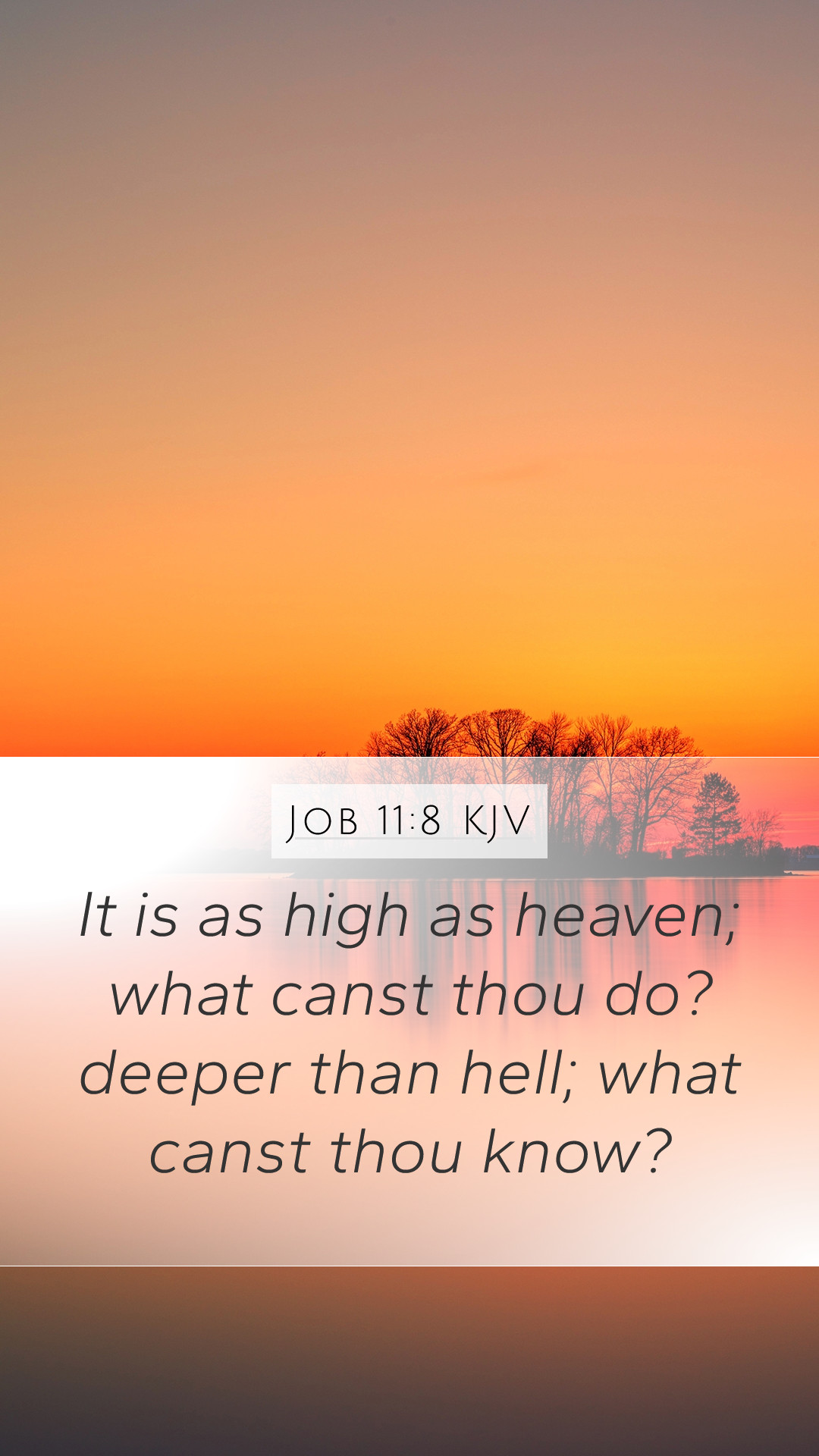Old Testament
Genesis Exodus Leviticus Numbers Deuteronomy Joshua Judges Ruth 1 Samuel 2 Samuel 1 Kings 2 Kings 1 Chronicles 2 Chronicles Ezra Nehemiah Esther Job Psalms Proverbs Ecclesiastes Song of Solomon Isaiah Jeremiah Lamentations Ezekiel Daniel Hosea Joel Amos Obadiah Jonah Micah Nahum Habakkuk Zephaniah Haggai Zechariah MalachiJob 11:8 Meaning
What is the meaning of Job 11:8?
It is as high as heaven; what canst thou do? deeper than hell; what canst thou know?
Job 11:8 Bible Verse Meaning
Understanding Job 11:8
Verse: Job 11:8 - "It is as high as heaven; what canst thou do? Deeper than hell; what canst thou know?"
Bible Verse Meanings
This verse is part of a larger discourse by Zophar, one of Job’s friends, addressing Job’s struggles and his claims of righteousness. Zophar emphasizes God’s infinite knowledge and power, contrasting it with human limitations.
Bible Verse Interpretations
Reflecting on the vastness of God, Zophar suggests that His ways and thoughts are beyond human understanding. This serves to underscore human ignorance in the face of divine wisdom, and the verse encourages humility and reverence before God's inscrutable nature.
Bible Verse Understanding
In essence, Job 11:8 highlights the theme of divine transcendence. It invokes the question of human capability to grasp the ways of God, driving home the point that divine truths can be unfathomable.
Bible Verse Explanations
- Heaven and Hell as metaphors: The "heaven" denotes the height of God’s majesty, while "hell" indicates the depths of human despair. Zophar’s argument posits that both existence are outside Job's comprehension.
- Human Limitations: Zophar categorically asserts that there are bounds to what humans can know or achieve, fostering a spiritual introspection among believers regarding their standing before God.
- God’s Wisdom: The verse emphasizes the complexity of divine wisdom, implying that God’s plans and purposes surpass human understanding.
Bible Verse Commentary
According to Matthew Henry, this verse conveys a solemn reminder of the limitations of human reason when confronted with divine realities. It serves as a caution against presumptive speculation about God’s intentions and decisions.
Albert Barnes elaborates on the idea that humans often err in judging divine actions, encouraging readers to abdicate their pride and seek submission to God’s greater plan.
Adam Clarke notes that Zophar's speech serves to illustrate the juxtaposition of human folly against God’s omniscience, urging individuals to adopt an attitude of humility in their spiritual walk.
Scripture Analysis
When examining Job 11:8, one might consider how the sentiments expressed here relate to the broader themes of the Book of Job, including suffering, divine justice, and human righteousness. The character of God is central to understanding Job’s trials, and this verse encapsulates the tension inherent in that relationship.
Related Bible Cross References
- Psalm 139:7-10 - God’s omnipresence.
- Isaiah 55:8-9 - The ways of the Lord are higher than ours.
- Romans 11:33-36 - The depth of God’s riches and wisdom.
Conclusion
In summary, Job 11:8 serves as a profound reminder of the greatness of God and the limitations of human understanding. It calls readers toward a deeper Bible study that emphasizes prayerful reflection and a willingness to trust in God’s wisdom, even in times of suffering.


